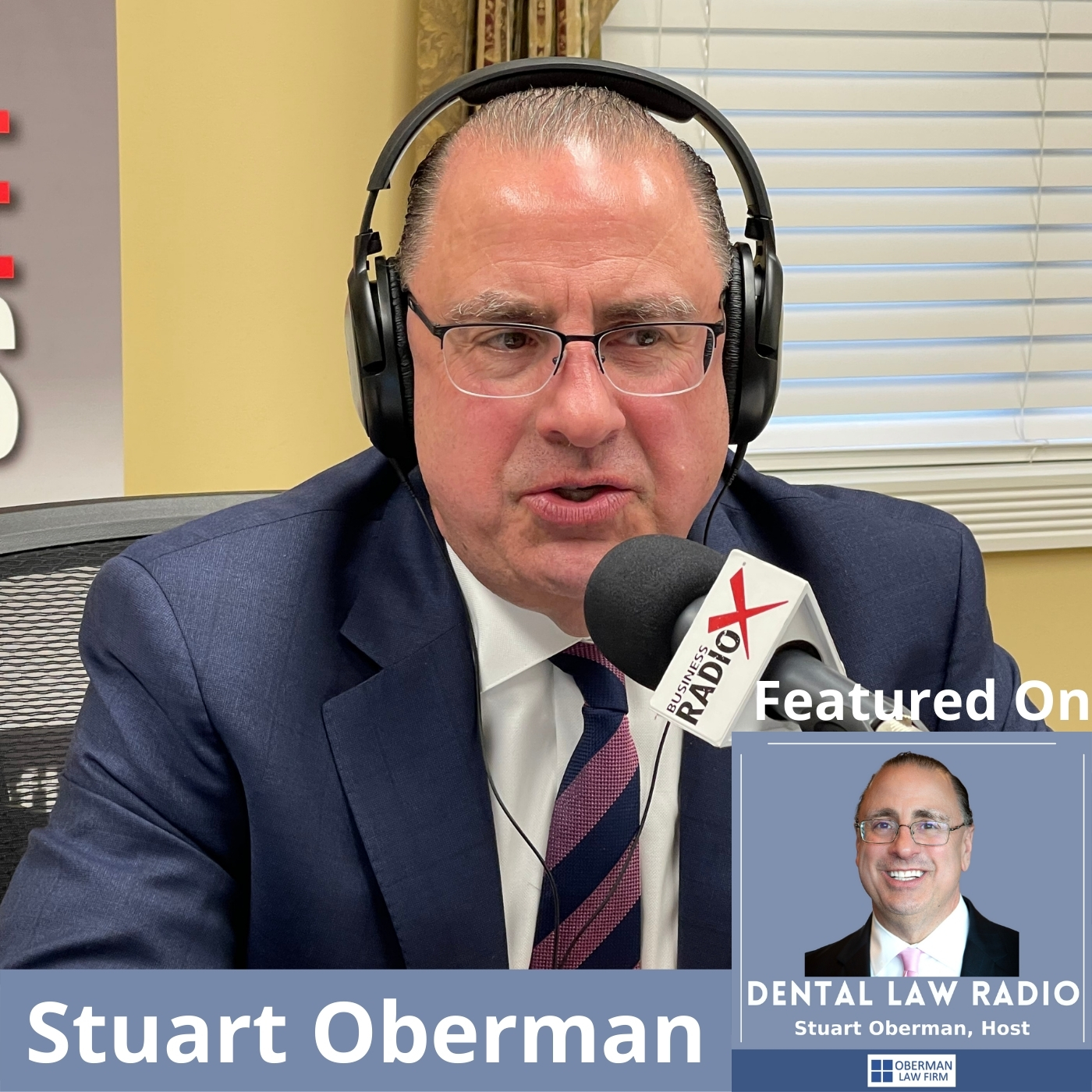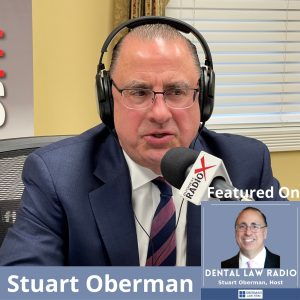

Employee Embezzlement (Dental Law Radio, Episode 24)
While industry statistics indicate about 40% of all dental practices are embezzled, Stuart Oberman believes the actual number is 60% or more, based on his work with clients and his conversations with other industry experts. So what are the most common employee embezzlement schemes, and how do you protect your practice? Stuart has answers in this episode. Dental Law Radio is underwritten and presented by Oberman Law Firm and produced by the North Fulton studio of Business RadioX®.
TRANSCRIPT
Intro: [00:00:02] Broadcasting from the Business RadioX Studios in Atlanta, it’s time for Dental Law Radio. Dental Law Radio is brought to you by Oberman Law Firm, a leading dental-centric law firm, serving dental clients on a local, regional and national basis. Now, here’s your host, Stuart Oberman.
Stuart Oberman: [00:00:26] Hello, everyone, and welcome to Dental Law Radio. Today’s topic is not a pleasant topic, but we are seeing a rise. Now, I have not talked about this topic in probably a couple of years because there has not been a necessarily need to but now it is rearing its ugly head.
Stuart Oberman: [00:00:48] Employee embezzlement. That’s right, folks. Employee embezzlement. And, the reason why I have not talked about this in a couple of years is because [inaudible] COVID-19. Our guys got hit number-wise. But we’re seeing an enormous rebound in our practices. Many, many, many of our practices, I’m going to say about 80% of our dental practices, had a record year. They’re busy. They’re having staff problems. They can’t keep up with the work. And, what happens is they’re simply losing track of what in the world they’re doing internally. I don’t have any other, I had no other explanation for it, is that they have no idea and can’t keep track what they’re doing internally.
Stuart Oberman: [00:01:33] So, employee embezzlement, and I will make this general statement. If you think your employees are not stealing from you, you are grossly mistaken. I’m going to give you some statistics, then I’m going to give you sort of what I think the real world is. Statistically, 40% of all dental practices are going to be embezzled, 40%. I’m going to tell you right now I believe it’s 60 to 70%. From what I’m seeing, from what I discover, when I talk to our consultants and industry experts, it’s about 60%. So, the average embezzlement statistically is about $110,000.
Stuart Oberman: [00:02:18] Now, I will tell you that statistically our average embezzlement that we handle is about 200,000 and has actually gone up to $500,000. Folks, if you don’t know where $500,000 is going, you’ve got a huge problem. You got a huge, huge problem.
Stuart Oberman: [00:02:46] So, the question is, you know, how, again, this is a relatively short podcast. This is a two-day seminar on the how’s, the why’s, the what’s, the reasons, and what you are not doing for employee embezzlement.
Stuart Oberman: [00:03:04] So, let’s take a look at some basic things here, without getting into white-collar crime to a great extent, numerous ways employees may embezzle. Take petty cash, [inaudible] you just shouldn’t have, you just shouldn’t have cash laying around. Altering deposit statements, where your deposit ticket is going. Do you even know what is being deposited in the bank?
Stuart Oberman: [00:03:32] Practice writing checks. Your practice writing checks for personal expenses. Your employees are paying their own credit cards with your money. Your office manager is writing fictitious invoices and diverting payments. And, let me tell you this, I will not give this speech, this podcast, this information to any organization that has dental office managers in it. Because that’s, I’m going to go very broad on this statement, but that is where most of the embezzlement is taking place on the management side because of the trust. So, I am not going to give this speech to that kind of audience.
Stuart Oberman: [00:04:21] So, you got phony bank accounts in a practice name and diverting payments, issuing fake refunds and taking refunds, paying their own medical expenses, bills, labs, supplies, drugs under the patient’s name. Do you even know what is being issued check-wise? So, those are just a few scenarios.
Stuart Oberman: [00:04:47] So, you know, how do you prevent this? You got to have a system in place. First and foremost, you have to have a system in place. The days are gone where you’re just running willy-nilly, you’re not paying attention and you’re trusting everyone under the sun that they’re not going to steal you blind.
Stuart Oberman: [00:05:08] So, how do you prevent it? First and foremost, you’ve got to screen your employees. In today’s world, in today’s tight labor market, our doctors are hiring bodies. Now, there are some agencies that will allow you to post for employment. Our doctors will go on those websites. And, I will guarantee you that if you pick 10 names today, and in a year you go back and say, I wonder what those employees are doing. Probably a good percent of them are going to be back looking for a job because our doctors don’t screen employees. They don’t have a hiring package. They don’t do background checks, which you have to have. For $100, your life can be very, very easy as far as background checks. They don’t check credit references. That’s a whole another area of fraud. You don’t verify information.
Stuart Oberman: [00:06:14] Good friend of mine has a recruiting agency for dental staffing. Amazing statistic, 70% of all application information, résumés are fraudulent. Seventy. You got to have procedures in place. You’ve got to implement internal controls. That’s going to vary practice to practice. But I would urge you to take a look at your system.
Stuart Oberman: [00:06:44] So, how do we prevent this? One thing you have to start doing is you’ve got to encourage employees and mandate employees to take days off for vacation because what happens is employees who are embezzling do not want to take time off because that’s where problems develop. They don’t take vacation days because that’s when problems develop. That’s when it seems to hit the proverbial fan if you will.
Stuart Oberman: [00:07:10] Rotate jobs among your employees. You want to cross-reference job descriptions. You want to have multiple people. Now, you’re going to have everyone under the sun have access to confidential information, your financials for sure, but cross-train. Enforce your regular hours. Why in the world is a team member in your office coming in at 6:00 in the morning and leaving 9 o’clock at night on a Friday or Monday through Thursday? And, why is your employee coming in on Saturdays and Sundays? And, are you checking your alarms for access? Are you checking your logs? Who’s coming in, who’s coming out? You may want to cross-reference and divide your financial responsibilities.
Stuart Oberman: [00:07:58] For goodness sakes, check your bank statements. If you are a solo practitioner, recommendation would be to have those sent to your home. After you look at them, then you could give them to the team member, or if you’re a small practice, you’re the sole owner, maybe multiple locations, have them sent to your house or your P.O. Box.
Stuart Oberman: [00:08:19] I said before eliminate petty cash. So, we could just question, you know, Stuart, you know, how do we know? What are the signs that employees may be embezzling? Flag giveaway. Failure to receive financial information in a timely manner. Let me tell you this. It’s not your employees are too busy, they don’t want to give you information. You’re asking, you’re asking and you’re asking for information, you’re not getting it. There’s a really good reason why in the world you are not getting your financials.
Stuart Oberman: [00:08:53] Employees resist change to an accounting system. Bingo. Accountability. We run into this a lot when our younger doctors who are all tech, all tech, are buying well-established practices who are not as tech. The well-established employees in those practices are kicking and screaming to change the accounting system. Why? It’s not because they don’t like you. It’s because they’re stealing their doctor blind.
Stuart Oberman: [00:09:30] Unexplained accounting adjustments. Let me tell you this. You better check, you better audit your files once a month. I don’t care if it’s 25 or 50. You better understand adjustments. Why are adjustments being made or do we make it for? Is it because Aunt Sarah was a great customer or is it because your employee, the front desk, is stealing you blind by adjustments?
Stuart Oberman: [00:09:55] In today’s world we used to say, well, you know, our collections have slowed if you’re drilling and feeling like no tomorrow, and all of a sudden you’re figuring out where your revenue’s at. Your billing cycle is good, you’ve got a huge problem.
Stuart Oberman: [00:10:10] So, what do you do? What do you do? What do you do? What do you do? First and foremost, you never, ever, ever confront the employee. You’re going to say, are you stealing from me? What are they going to say? Yes, I’m stealing you blind. So, you never confront the employee. First and foremost, hire a counselor who understands employee embezzlement on the dental side. And then, get a forensic accountant that understands auditing, that understands the Dentrix, that now understands open-source systems under today’s technology world. Do they understand the software? Do they understand Eaglesoft? So, those are just things you have to keep in mind.
Stuart Oberman: [00:11:00] Spot audit if you suspect there’s employee embezzlement. Take 25, take 30 files. Audit those files like there’s no tomorrow. Where’s the money going? Where’s the money staying? Is it coming into credit card accounts? Do you even know where your money is going? Are you looking at your EOBs? Are you reconciling your day sheets, your credit cards? What are you doing? How are you looking at it?
Stuart Oberman: [00:11:24] I will tell you, your CPA has absolutely no clue regarding embezzlement. If you think that you’re relying on your CPA to catch your embezzlement, you are grossly and sadly mistaken. Your CPA, on average the general CPA that does dental work has absolutely no clue regarding employee embezzlement or how to handle it.
Stuart Oberman: [00:11:48] So, what do you do? First and foremost, again, obtain legal counsel. Get a strategy. Work with an outside CPA or on a forensic audit. Figure out what you have, what you don’t have, and then confront. If you suspect embezzlement, everyone in your office is in play including, I’m going to say this and I’m sorry ladies and gentlemen, but your spouses. Your spouses. That is right, your spouse.
Stuart Oberman: [00:12:19] I will never forget. One of our doctors was missing about 60 to $80,000 in funds. Come to find out, the doctor was having an affair and the wife was stealing off the top to build a war chest for divorce. And then, that’s where our doctor’s 60 to $80,000 went. You can’t buy this information. So, everyone is in play, including your partners, spouses, partner’s spouses, the longtime assistants. You cannot believe who will be stealing from you.
Stuart Oberman: [00:13:00] So, overall, if you suspect that there is employee embezzlement, chances are you’re probably correct. Start with an internal audit. Start with what don’t I know. Get help immediately. Get access to information quickly. And then, formulate a game plan before you confront the employee who’s never ever in their life going to tell you, yeah, I’m stealing you blind.
Stuart Oberman: [00:13:33] And, if you think for one second that your local police department is going to help you recover 2 or $300,000, guess again. One, they’re under enormous pressure. Our police departments on a local level are under enormous pressure. They’re understaffed. During a working environment that I’ve never seen before in my life, they’re dealing with gangs, murderers, rapists, large-time thieves. Do you think they, I’m not going to say they don’t care but they don’t have the time to worry about a dentist who’s had a couple of $100,000 stolen from them.
Stuart Oberman: [00:14:19] So, again, it’s a five-hour broadcast that I could talk with all day. Take a look at what you have. If you suspect you have embezzlement, your gut instinct is probably right. Take the steps on what you need to do to get it under control and move forward.
Stuart Oberman: [00:14:36] Folks, thank you very much for joining the podcast on employee embezzlement. If you have any questions or concerns, please feel free to give us a call, Oberman Law Firm. My name is Stuart Oberman, 770-886-2400, or email me at stuart, S-T-U-A-R-T, @obermanlaw.com. Thanks for joining us and have a fantastic day.
About Dental Law Radio
Hosted by Stuart Oberman, a nationally recognized authority in dental law, Dental Law Radio covers legal, business, and other operating issues and topics of vital concern to dentists and dental practice owners. The show is produced by the North Fulton studio of Business RadioX® and can be found on all the major podcast apps. The complete show archive is here.
Stuart Oberman, Oberman Law Firm

Stuart Oberman is the founder and President of Oberman Law Firm. Mr. Oberman graduated from Urbana University and received his law degree from John Marshall Law School. Mr. Oberman has been practicing law for over 25 years, and before going into private practice, Mr. Oberman was in-house counsel for a Fortune 500 Company. Mr. Oberman is widely regarded as the go-to attorney in the area of Dental Law, which includes DSO formation, corporate business structures, mergers and acquisitions, regulatory compliance, advertising regulations, HIPAA, Compliance, and employment law regulations that affect dental practices.
In addition, Mr. Oberman’s expertise in the health care industry includes advising clients in the complex regulatory landscape as it relates to telehealth and telemedicine, including compliance of corporate structures, third-party reimbursement, contract negotiations, technology, health care fraud and abuse law (Anti-Kickback Statute and the State Law), professional liability risk management, federal and state regulations.
As the long-term care industry evolves, Mr. Oberman has the knowledge and experience to guide clients in the long-term care sector with respect to corporate and regulatory matters, assisted living facilities, continuing care retirement communities (CCRCs). In addition, Mr. Oberman’s practice also focuses on health care facility acquisitions and other changes of ownership, as well as related licensure and Medicare/Medicaid certification matters, CCRC registrations, long-term care/skilled nursing facility management, operating agreements, assisted living licensure matters, and health care joint ventures.
In addition to his expertise in the health care industry, Mr. Oberman has a nationwide practice that focuses on all facets of contractual disputes, including corporate governance, fiduciary duty, trade secrets, unfair competition, covenants not to compete, trademark and copyright infringement, fraud, and deceptive trade practices, and other business-related matters. Mr. Oberman also represents clients throughout the United States in a wide range of practice areas, including mergers & acquisitions, partnership agreements, commercial real estate, entity formation, employment law, commercial leasing, intellectual property, and HIPAA/OSHA compliance.
Mr. Oberman is a national lecturer and has published articles in the U.S. and Canada.
Oberman Law Firm
Oberman Law Firm has a long history of civic service, noted national, regional, and local clients, and stands among the Southeast’s eminent and fast-growing full-service law firms. Oberman Law Firm’s areas of practice include Business Planning, Commercial & Technology Transactions, Corporate, Employment & Labor, Estate Planning, Health Care, Intellectual Property, Litigation, Privacy & Data Security, and Real Estate.
By meeting their client’s goals and becoming a trusted partner and advocate for our clients, their attorneys are recognized as legal go-getters who provide value-added service. Their attorneys understand that in a rapidly changing legal market, clients have new expectations, constantly evolving choices, and operate in an environment of heightened reputational and commercial risk.
Oberman Law Firm’s strength is its ability to solve complex legal problems by collaborating across borders and practice areas.
Connect with Oberman Law Firm:
Company website | LinkedIn | Twitter















